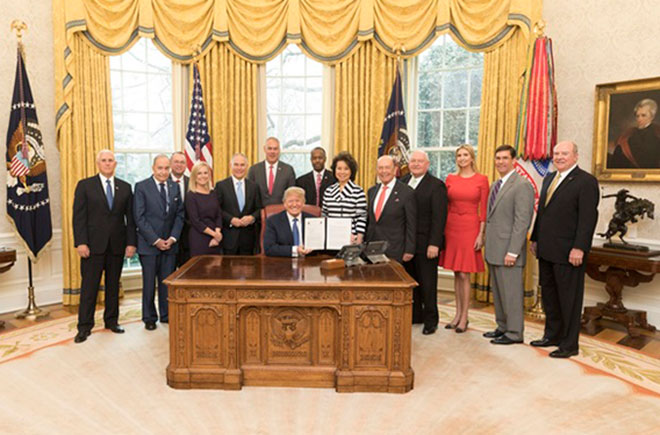Senior Reporter
Federal Agencies Sign Agreement to Streamline Infrastructure Permitting
A dozen federal agencies have pledged to streamline environmental permitting for major infrastructure projects, a priority President Donald Trump has pursued since he took office.
The leaders of agencies such as the departments of Transportation, Energy, Housing and Urban Development, Agriculture and Homeland Security, as well as the Environmental Protection Agency and Army Corps of Engineers, signed the memorandum of understanding April 9. It went into effect the following day.
The agreement implements an executive order Trump signed last year seeking to reduce the federal permitting time for major projects to two years.

Chao joins Trump and other Cabinet members in signing the memorandum of understanding that streamlines environmental permitting. (Department of Transportation)
“To help achieve this goal, agencies commit to cooperate, communicate, share information and resolve conflicts that could prevent meeting milestones,” according to the memorandum the agencies signed. “Lead and cooperating agencies will be determined as soon as practicable.”
Specifically, under the agreement an agency would develop environmental impact statements with the goal of completing such reviews within two years. Accordingly, the single agency would assign a “management official to lead the environmental review process and identifying a primary federal point of contact at each cooperating or participating agency for the project.”
This lead agency would be tasked with updating other officials at agencies with an interest about a certain project. The agency also would develop a “purpose and need” plan to identify the “range of alternatives to be analyzed, identifying the preferred alternative and determining whether to develop the preferred alternative to a higher level of detail.”
The memorandum of understanding falls in line with Trump’s aim at the environmental permitting process. Trump continues to criticize lengthy reviews for big-ticket infrastructure projects. His 10-year, $1.5 trillion infrastructure proposal unveiled in February, which has yet to advance in the Republican-led Congress, calls for streamlining the overall process.
It is essential for all federal resource agencies to work together to cut red tape and deliver infrastructure and safety improvements more rapidly and spurring economic growth.
Transportation Secretary Elaine Chao
“Under our plan, every project will have one point of contact that will deliver one decision — ‘yes’ or ‘no’ — for the entire federal government; ‘yes’ or ‘no.’ You have to go through different agencies. You go through [the Department of] Labor. You go through [the Department of] Transportation. You go through another one, another one,” Trump told union workers in Ohio on March 29.
“America built the Empire State Building in one year. Think of it: one year,” Trump continued. “Now it can take 10 years just to get permits to build a roadway, a tunnel, even, in some cases, a building.”
Transportation Secretary Elaine Chao was among the Cabinet secretaries to champion the multiagency agreement.
“It is essential for all federal resource agencies to work together to cut red tape and deliver infrastructure and safety improvements more rapidly and spurring economic growth,” Chao said in a statement published on the department’s website April 9.
Republican transportation leaders who have over the years criticized lengthy environmental reviews also welcomed the agreement.
“Time is money. Reviewing and approving infrastructure projects in the most efficient way possible is critical to our nation’s efforts in building a 21st-century infrastructure and keeping project costs from escalating,” said Rep. Bill Shuster (R-Pa.), chairman of the House transportation panel.
“The president’s plan sets a two-year goal of completing the permitting process. Roads, bridges, dams and water systems that take months to build shouldn’t take a decade to permit. This is a common-sense idea that will help get projects done faster, better, cheaper and smarter,” added Environment and Public Works Committee Chairman John Barrasso (R-Wyo.), Shuster’s senate counterpart.
Several top Democrats on the congressional transportation committees, meanwhile, have emphasized the five-year 2015 FAST Act highway law that had garnered bipartisan support established policies designed to speed up the permitting process for big projects.




